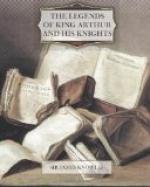So, on the morrow, there came a damsel from Queen Morgan to the king, and brought with her the richest mantle that ever was seen, for it was set as full of precious stones as they could stand against each other, and they were the richest stones that ever the king saw. And the damsel said, “Your sister sendeth you this mantle, and prayeth you to take her gift, and in whatsoever thing she hath offended you, she will amend it at your pleasure.” To this the king replied not, although the mantle pleased him much. With that came in the lady of the lake, and said, “Sir, put not on this mantle till thou hast seen more; and in nowise let it be put upon thee, or any of thy knights, till ye have made the bringer of it first put it on her.” “It shall be done as thou dost counsel,” said the king. Then said he to the damsel that came from his sister, “Damsel, I would see this mantle ye have brought me upon yourself.” “Sir,” said she, “it will not beseem me to wear a knight’s garment.” “By my head,” said King Arthur, “thou shall wear it ere it go on any other person’s back!” And so they put it on her by force, and forthwith the garment burst into a flame and burned the damsel into cinders. When the king saw that, he hated that false witch Morgan le Fay with all his heart, and evermore was deadly quarrel between her and Arthur to their lives’ end.
CHAPTER VIII
King Arthur conquers Rome, and is crowned Emperor
And now again the second time there came ambassadors from Lucius Tiberius, Emperor of Rome, demanding, under pain of war, tribute and homage from King Arthur, and the restoration of all Gaul, which he had conquered from the tribune Flollo.
When they had delivered their message, the king bade them withdraw while he consulted with his knights and barons what reply to send. Then some of the younger knights would have slain the ambassadors, saying that their speech was a rebuke to all who heard the king insulted by it. But when King Arthur heard that, he ordered none to touch them upon pain of death; and sending officers, he had them taken to a noble lodging, and there entertained with the best cheer. “And,” said he, “let no dainty be spared, for the Romans are great lords; and though their message please me not, yet must I remember mine honour.”
Then the lords and knights of the Round Table were called on to declare their counsel—what should be done upon this matter; and Sir Cador of Cornwall speaking first, said, “Sir, this message is the best news I have heard for a long time, for we have been now idle and at rest for many days, and I trust that thou wilt make sharp war upon the Romans, wherein, I doubt not, we shall all gain honour.”
“I believe well,” said Arthur, “that thou art pleased, Sir Cador; but that is scarce an answer to the Emperor of Rome, and his demand doth grieve me sorely, for truly I will never pay him tribute; wherefore, lords, I pray ye counsel me. Now, I have understood that Belinus and Brennius, knights of Britain, held the Roman Empire in their hands for many days, and also Constantine, the son of Helen, which is open evidence, not only that we owe Rome no tribute, but that I, being descended from them, may, of right, myself claim the empire.”




